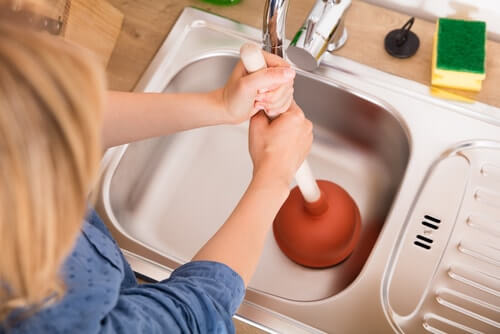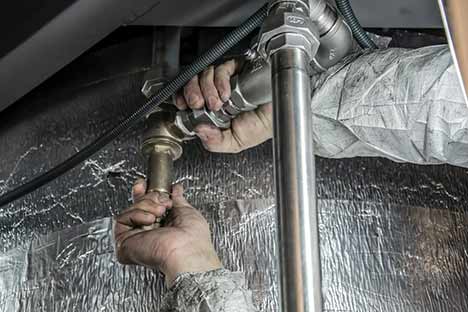How to Handle Emergency Plumbing Problems Before Professional Help Arrives
How to Handle Emergency Plumbing Problems Before Professional Help Arrives
Blog Article
Nearly everybody will have his or her own thinking about Plumbing Emergencies: Tips on What To Do Before.

Pipes emergencies can strike any time, creating anxiety and prospective damage to your home. Whether it's a burst pipe, a clogged drainpipe, or a leaking faucet, recognizing just how to handle the situation till a specialist plumbing technician shows up can save you from more difficulties. This post offers important emergency situation pipes suggestions to help you mitigate damages and gain back control during a pipes situation.
Shut off the Water Supply
The very first step in any type of plumbing emergency situation is to turn off the supply of water. For local problems, such as a leaking tap or bathroom, turn off the shutoff near the component. In the case of a significant leak or burst pipeline, locate your home's major water shut-off shutoff and turn it off quickly. Understanding the area of these shutoffs beforehand can conserve important time during an emergency situation.
Address Small Leakages with Short-term Solutions
Little leaks can promptly come to be significant issues if left unattended. Make use of these short-term repairs until specialist help gets here:
While these fixes aren't long-term, they can aid reduce water loss and damage.
Unclog Drains Pipes Securely
A blocked drainpipe can be a frustrating and untidy concern. Here's just how to tackle it:
If these techniques don't work, avoid using too much pressure, as it might aggravate the obstruction.
Handle Overflowing Toilets
An overflowing toilet can cause prompt disorder. Below's what you must do:
Shut down Your Hot Water Heater
In specific emergencies, such as a burst pipe, it's a good idea to shut off your hot water heater. This stops getting too hot or damage to the unit when water quits moving. Shut off the power supply to the water heater (electric or gas) and let it cool down to avoid possible dangers.
Briefly Stop a Ruptured Pipeline
A burst pipe can bring about considerable water damage in mins. To minimize the problem:
Call a professional plumbing professional promptly to address the trouble permanently.
Handle Frozen Water Lines Thoroughly
In cooler environments, frozen pipelines are a common emergency. If you suspect an icy pipe:
Prevent Additional Damage
Taking fast activity to reduce damages can save you time and money in the future. Here's exactly how:
. Have an Emergency Plumbing Set
Prepare a basic plumbing emergency situation package to deal with small problems effectively. Your kit must include:
Having these tools handy can make a substantial difference in your capability to handle emergency situations.
Know When to Call a Professional.
While quick fixes can help briefly, specific pipes issues require instant expert focus. Call a plumber if:.
Without delay contacting a professional guarantees the problem is fixed properly and stops additional issues.
Final thought.
Pipes emergency situations can be frustrating, however with the best understanding and tools, you can handle the circumstance efficiently up until assistance arrives. By turning off the supply of water, dealing with small leaks, and using temporary fixes, you can decrease damages and maintain your home safe. Keep in mind, these ideas are momentary services; always speak with a certified plumber to handle the origin of the trouble. Prep work and quick thinking are your best allies in any kind of pipes emergency situation.
8 Helpful Tips for Managing Plumbing Emergencies at Home
If your plumbing system hasn’t failed once, wait for it because almost everyone has a story to tell. Sometimes, it could be simple emergencies such as a leaking pipe, a blocked cistern, or even a big burst pipe. In situations like this, you need to have some handy tips to save you some money and from possible damages.
Take care of minor issues early.
Sometimes, you could have avoided an emergency by taking proactive measures while it was still early. Some major plumbing emergencies can be a result of an ignored minor issue. We recommend that you have items like plumbing tapes and other related items. A plumbing tape can allow you to manage minor leaks before the plumber arrives.
Cut off the water supply.
This tip is essential in almost any type of leakage problem. For problems like minor leakages in the toilet or kitchen, turn off the supply that takes water to the affected pipes. If the leakage is a major pipe, you must shut off the supply valve to the entire building. This will help you avoid flooding your home and neighbors if you share a flat.
Know your plumbing system
Folks typically move into a new apartment without understanding the water supply around the building. This can prove disastrous if a water emergency arises and the plumber is far away. The previous tip will prove useless if you don’t practice this one. More importantly, know where your water shut-off valve is located – you’ll need that knowledge to prevent potential home floods.
Have some common handy tools
There are lots of plumbing emergencies that you can handle without hiring a plumber. That’s why you must keep some tools available always. Some tools that you can use to fix simple plumbing emergencies easily include plumbing tapes, screwdrivers, thread seal tapes, plungers, pliers, tape measures, and rubber gloves.
Insulate your pipes from cold
You’ll save yourself from many plumbing expenses if you protect your water pipes from the cold. This is because of the harmful effects that cold weather can have on your pipes. During winter, your pipes can burst from being overly expected to freezing temperatures. So, make sure insulators are there to keep the pipes working correctly.
Avoid practices that will clog your toilet.
Many people indulge in practices that can damage the plumbing system of the entire building. One of these is when they use their toilet to dispose-off garbage. They flush all kinds of things, such as paper towels, bandages, hairs, female sanitary products, etc., down the toilet. This will block your toilet in the long run, incurring unnecessary expenditures. Dump such waste in the trash instead.
Check your dials regularly.
Sometimes, there could be leakages in your home without noticing them in time. So, constantly monitor your water meter dial. If the dial is reading when there is nobody using water, this is an indicator that there is leaking. Check for leaks immediately. Call a plumber as soon as possible if you can’t find any.
https://www.constructionplacements.com/8-helpful-tips-for-managing-plumbing-emergencies-at-home/

Hopefully you enjoyed reading our excerpt on Expert Tips for Emergency Plumbing Repairs. Thanks so much for taking the time to browse our post. Do you know about somebody else who is enthusiastic about the niche? Please feel free to promote it. We take joy in your readership.
Click Here Report this page